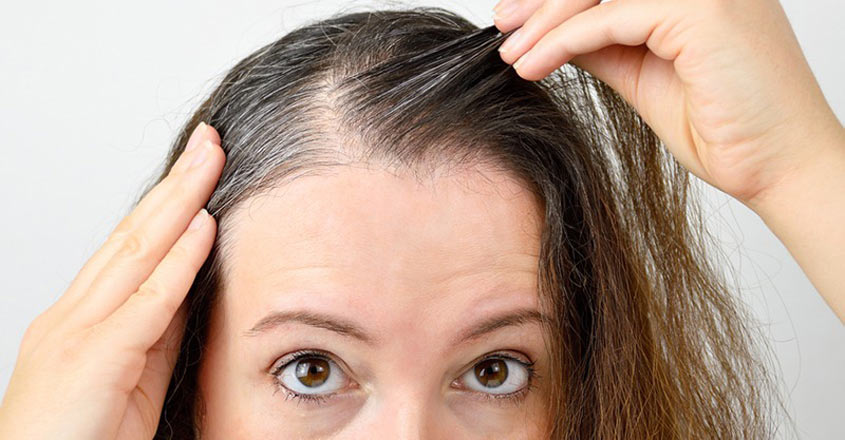Table Of Content

Reducing stress in your life is a good goal, but it won't necessarily turn your hair to a normal color. The results were compared with each volunteer's stress diary, in which individuals were asked to review their calendars and rate each week's level of stress. The findings can help illuminate the broader effects of stress on various organs and tissues. This understanding will pave the way for new studies that seek to modify or block the damaging effects of stress.
About NIH Research Matters

Without stem cells left to create new pigment cells, new hair turns gray or white. Because stress affects the whole body, researchers first had to narrow down which specific systems were involved. The team first hypothesized that stress causes an immune attack on pigment-producing cells. However, when mice lacking immune cells still showed hair graying, researchers turned to the hormone cortisol. The mitochondria connection between stress and hair color differs from that discovered in a recent study of mice, which found that stress-induced graying was caused by an irreversible loss of stem cells in the hair follicle.
Suffering From Gray Hair At A Young Age? Experts Reveal What This Means - SheFinds
Suffering From Gray Hair At A Young Age? Experts Reveal What This Means.
Posted: Sat, 15 Jul 2023 07:00:00 GMT [source]
What? Another medical form to fill out?
You can also use temporary at-home coloring techniques to disguise roots. Mincho Pacheco, master hairstylist and colorist at James Joseph salon, recommends using a little bit of makeup to cover grays. Lack of certain nutrients has been found to play major roles in premature graying. According to one study, low ferritin, calcium, and vitamin D-3 all affect graying, while another study concluded that low copper, zinc, and iron advance premature graying. Environmental and nutritional factors may also be credited for graying, especially premature graying. “Stress, smoking, and an unbalanced diet are a number of the reasons why we may start experiencing premature graying,” explains nutritional expert for Maple Holistics, Caleb Backe.
Stay on top of latest health news from Harvard Medical School.
Stress speeds up hair greying process, science confirms - The Guardian
Stress speeds up hair greying process, science confirms.
Posted: Wed, 22 Jan 2020 08:00:00 GMT [source]
"Graying could be a result of chronic free radical damage," says Ralf Paus, professor of dermatology at the University Hospital Schleswig-Holstein in L? Hair melanin comes in two shades—eumelanin (dark brown or black) and pheomelanin (yellow or red)—that combine in different proportions to create a vast array of human hair colors. Hair that has lost most of its melanin is gray; hair that has lost all of this pigment is white. Legend has it that Marie Antoinette's hair turned white the night before she was guillotined. Presumably the stress of impending decapitation caused her locks to lose color within hours.
They had three groups, each exposed to a different level of stress. The study determined that noradrenaline (norepinephrine) was the reason for this occurrence. Few harbingers of old age are clearer than the sight of gray hair.
Special Health Reports
After eliminating the immune system and the stress hormone cortisol as causes of the color change, the team discovered that part of the animals’ nervous system was depleting pigment cells from hair. Chemicals released during the stress response — specifically norepinephrine — causes pigment producing stem cells to activate prematurely, depleting the hair’s “reserves” of color. The researchers eventually turned to the neurotransmitter noradrenaline, which, along with corticosterone, was elevated in the stressed mice.
This signaled a reversal in the normal graying process, which begins at the root. While hairs are growing, cells receive chemical and electrical signals from inside the body, including stress hormones. These signals seem to change proteins under the roots, and those proteins harden once the hair grows out of the scalp. Melanocyte stem cells, which live within the hair follicle at the base of the hair strand, make melanocytes. Hair color is determined by melanocytes which produce the pigment melanin. Research shows that chronic stress can decrease stem cells that produce pigment of color in your hair.
Gray hair is really hair with reduced melanin, while white hair completely lacks it. That’s partly because of a gradual decline in the number of stem cells that mature to become melanin-producing cells. The cells may wear out, become damaged, or lose the support systems meant to keep them working. Genes are also a factor, since they help control melanin production.
They found that noradrenaline, also known as norepinephrine, was key to stress-induced hair graying. By injecting noradrenaline under the skin of unstressed mice, the researchers were able to cause melanocyte stem cell loss and hair graying. To connect stress with hair graying, the researchers started with a whole-body response and progressively zoomed in on individual organ systems, cell-to-cell interaction, and, eventually, all the way down to molecular dynamics. The process required a variety of research tools along the way, including methods of manipulating organs, nerves, and cell receptors. Hair growth demands lots of energy and while strands are growing, cells receive signals from the body, including stress hormones, the authors write. It’s possible these exposures trigger changes in hair pigmentation.
“It's interesting to note that it is the perception of stress that is important. So if we feel we have the resources to handle the situation we're less likely to experience chronic stress." The first silvery strands usually pop up around age 30 for men and age 35 for women, but graying can begin as early as high school for some and as late as the 50s for others.
Once inside the hair follicle, Hill says the stress hormone causes the melanocytes in the dermal papilla — which houses all the cells that determine hair's characteristics, per the Journal of Dermatological Science — to die. Until recently, little scientific evidence of a link between stress and gray hair has been shown. But a 2020 study on mice found that the body’s response to acute stress plays a key role in turning hair gray. Hsu and her colleagues stressed mice by injecting them with a compound closely related to capsaicin, the active ingredient in chili peppers.
No comments:
Post a Comment